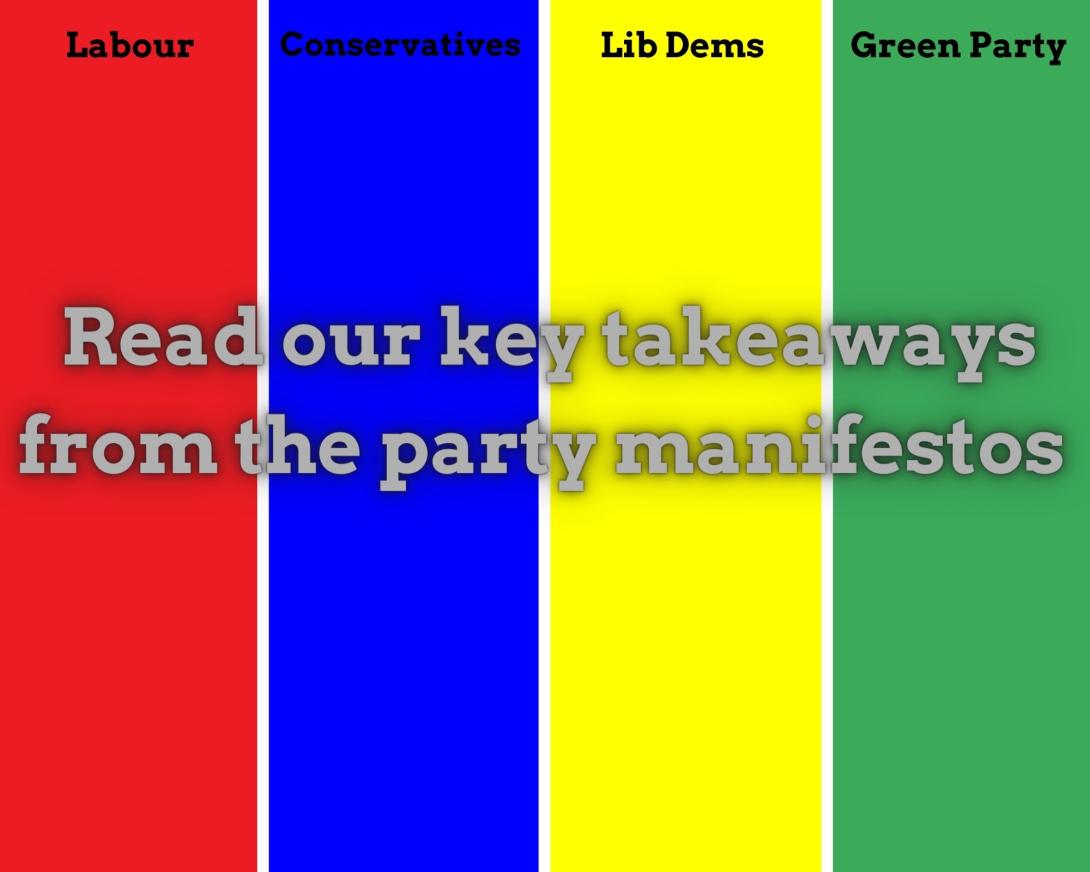17 June 2024
Your ultimate guide to the 2024 party manifestos

By Public Affairs Lead Joss MacDonald
In the run up to the General Election on 4 July, the major political parties have released their election manifestos to set out their programmes for government.
We’ve looked the party manifestos of the Conservatives, Labour, the Liberal Democrats, the Greens, and Reform UK through the lens of our own Food Foundation manifesto – Election 24: Nourishing the Nation.
It sets out the major policies we want to see all political parties commit to in the election campaign to ensure that a healthy and sustainable diet is available to all. It is organised around five priority pillars where we know change is needed.
So who delivered in which areas?
1. Make Healthy and Sustainable Food Affordable
This part of our manifesto is about rebalancing food prices so healthy foods are the least expensive while also giving households the resources they need so that no one is ever forced to choose between eating cheaply and eating well.
Our priority policies in this area include building on the success of the Soft Drinks Industry Levy by introducing new fiscal policies that encourage businesses to reformulate other food and drink categories and generate revenue to invest in nutritional safety nets, and requiring the cost of health and sustainable diets to be taken into account when setting benefit and wage levels.
Out of the five major parties, it is the Green Party which have the strongest offer in this area. Their manifesto includes an explicit commitment ensuring people have ‘sufficient income to make healthy sustainable food choices’, which gets to the heart of this issue. To do this, they have clear policies including raising the minimum wage, Universal Credit, disability benefits and carer’s allowance, along with a commitment to ensure that pensions are uprated.
The Liberal Democrat manifesto also includes strong policies that would go a long way to ensure healthy and sustainable food was affordable to more. Their commitment includes raising Universal Credit in line with life essentials such as food and bills, although they do not have a blanket commitment to raise the living wage. They do, however, commit to a strategy to end ‘deep poverty’ within a decade.
The Liberal Democrats are the only party to commit to expanding the soft drinks industry levy with their policy to expand it to milk-based drinks which are not currently covered. Their policy does however stop short of the necessary expansion to food.
Both the Green Party and the Liberal Democrats have a commitment to scrap the two-child benefit limit, which according to the Child Poverty Action Group, would lift 250,000 children out of poverty.
This is a very notable omission from Labour’s manifesto. The party has not committed to scrapping the limit, despite coming under a lot of pressure from some of its MPs, the trade unions, and centre left think tanks which are close to the party.
Labour instead has said it will set out an ‘ambitious strategy to reduce child poverty’ as well as having an exciting ambition to ‘end mass dependence on emergency food parcels’. However, in both cases, there is no concrete evidence of how this will be achieved if Labour comes to power.
Although Labour are not committing to directly raising the living wage for the majority of workers, they are committing to removing the discriminatory age bands, and changing the remit of the independent Low Pay Commission so it will take account of the cost of living for the first time. If Labour are elected, we will work to ensure that the cost of a healthy and sustainable diet is taken into consideration.
On food prices specifically, Labour say they’ll reduce prices by removing barriers to business trading. However, it is not clear what these will be or how this will happen.
Reform UK have a commitment to raise the income tax threshold to £20,000 which will help those who are in work and are struggling with food insecurity, but will not help those who are not working. Their proposal to withdraw benefits from job seekers who do not find work within four months would undoubtedly lead to a rise in those struggling to make ends meet.
When it comes to the price of food itself, Reform UK have said they’ll also give the Competition and Markets Authority the power to ensure fair pricing.
The Conservatives have said they’ll take two pence off National Insurance which, as with the Reform proposals, would help those in work, but would not help those who are not in work. The party also wants to maintain the National Living Wage, but their proposal of further cuts to disability benefits is very concerning.
Food Foundation data shows that food insecurity is substantially higher in households in receipt of Universal Credit, standing at 45%. Households with a disabled adult were 3.6 times more likely to experience food insecurity compared to a household with adults who were not disabled. To reduce poverty and food insecurity, we need to ensure that benefits are sufficient to meet rising food costs and cover basic needs.
As a former senior advisor the last government noted on Twitter/X, this year’s ‘election campaigns are largely ignoring the massive rise in genuine destitution’. This certainly comes through in the party manifestos, particularly from the two parties who have historically formed governments in the UK.
Policies to make healthy food more affordable are also totally absent from the programmes of all the parties. That is why The Food Foundation will continue to champion better financial support, and food system incentives to ensure healthy food is affordable for all, while also continuing to be involved in the Recipe for Change campaign to build on the success of the Soft Drinks Industry Levy, to help incentivise change and raise much needed revenue to help make healthy food more affordable.
2. Stop the Junk Food Cycle
Less healthy food has crept into all parts of our daily life, including in our shops, our homes and our high streets. In this part of our manifesto, we reflect on that fact that foods that were once eaten occasionally now make up a large proportion of what we eat, leading to diet-related disease and unsustainable pressure on the NHS.
Our priority policies in this area include ensuring the legislation on advertising and multibuy promotions is enacted, more national government support for local authorities to enact their powers to improve local food environments and more investment in advertising of healthy and sustainable food such as fruit and vegetables.
Labour, the Conservatives and the Lib Dems all have manifesto commitments to restrict advertising of junk food for children. This is likely to mean the enacting of the Conservative government’s delayed legislation on this issue, yet it is still incredibly encouraging to see that there is consensus amongst the top three parties.
Additionally to this, Labour have announced that they will ban the sale of high-caffeine energy drinks to under 16s. This is a welcome acknowledgement that food manufacturers are producing and marketing products which can harm our children, and these practices must be subject to regulation.
The Conservatives and the Green Party both talk about the issue of ultra-processed food in their manifesto, although neither party has offered up detailed policy solutions about what they intend to do about it. The Conservatives do however commit to publishing their long awaited Major Conditions Strategy.
The Greens do however say that they will commit to investing in public health, which would include interventions in food as well as alcohol and tobacco. Labour make a similar pitch, saying they’d like greater focus on prevention in the healthcare system, although they do not specifically mention food as a necessary area of intervention.
Although it is not in their manifesto, Labour have announced that they will commit to an obesity strategy if they win power, although we do not have details of what it will contain. It is important that it must be focused on improving the food that people can access and afford.
The Greens have the strongest wording in this section, noting that poor diet costs our NHS £6.5 billion per annum, and is a result of government failure to tackle the unhealthy food lobby. This is an incredibly welcome acknowledgement, although it is a significantly lower figure than the £19 billion cost to the NHS made by Frontier Economics, who also estimate the cost of obesity and overweight to the economy as a whole being £98 billion.
It is Labour, the Conservatives and the Liberal Democrats who have come forward with a concrete policy that would make a difference by restricting junk food advertising to children. It is an easy policy to propose though, seeing as the legislation has already been passed by Parliament.
However, there is still a sense that the political parties are behind the curve in recognising the huge impact that poor diet is having on people’s health in the UK. From reading these manifestos, you would not guess that diet is is a leading cause of ill health in the UK.
3. Invest in Children’s Diets
In our manifesto, we recognise that improving access to nutritious food for all children is essential if they are to achieve their full potential – improving their health, their educational outcomes and their future economic prospects.
Every child has the right to a healthy diet, no matter where they were born. Our priority policies to improve children’s diets include expanding free school meals, expanding and improving Healthy Start and increasing the amount of fruit and vegetables in schools.
Healthy Start remains absent from the all the party manifestos, which make the expansion of free school meals the major fault line between the parties as the Lib Dems and the Greens have both committed to expanding on the current provision.
Despite the Liberal Democrats 2023 Autumn Conference endorsing a policy of expanding free school meal provision in both primary and secondary schools, their election manifesto only mentions primary school free school meals. The manifesto policy is to expand provision to all primary school children living in poverty, with the eventual aim of universal free school meal provision across primary schools.
The Green Party however has the strongest commitment to ensure universal provision to primary school and secondary school students. The Greens are also the only party to talk about the quality of those meals, with a commitment that meals will be ‘made from nutritious ingredients and based on local and organic or sustainable produce’. Additionally, the Green Party commits to free breakfast clubs for primary school children.
The Labour Party manifesto also commits to free breakfast clubs for primary school children but the lack of ambition to provide more children with a hot free school meal at lunch time is notable. In fact, there is no mention at all of free school meals in the Labour manifesto, despite universal primary free school meals being a major achievement of the Labour Mayor of London, Sadiq Khan, and the Labour government in Wales.
While the Conservative manifesto boasts that "Free School Meals have been extended to more groups of children than under any other government over the past half a century”, there is no mention of expanding provision to the 900,000 children who are currently living in poverty in England but who still do not qualify. Nor is there any mention of other policies to directly tackle poor diets and hunger among children in our society. This agenda is not covered in the Reform UK manifesto.
It is disappointing that neither Labour nor the Conservatives have anything to offer on ensuring that as many children as possible receive a free hot and nutritious meal during the school day, although Labour’s commitment to universal free breakfast clubs is welcome.
The parties’ reasons for not expanding free school meals will likely be one of cost, but we have to realise that providing our children with nutritious food is not a sunken cost, but an investment in their future which will benefit their attainment, development, and health.
4. Make it Easier to Eat Sustainably
Meeting the UK’s net zero targets will be impossible if we don’t reduce greenhouse gas emissions from the food system. This means changing both how we produce our food, as well as what we eat including eating less meat and dairy.
In this part of our manifesto, we highlighted several priority policies to improve the sustainability of our diet, including strengthening government procurement policies, a commitment to a horticulture strategy, and using a sustainable Eatwell plate to inform food policies.
The common theme with regards to the sustainability of food across the party manifestos is public procurement. In this instance, it is Reform UK who have the most ambitious target. They are wanting 75% of food served by taxpayer funded institutions to be from the UK.
The Conservatives and Labour both have the very similar wording to each other, with a target for 50% of food purchased across the public sector to be local or to higher environmental standards. It is worth noting that in both manifestos, it is unclear what is meant by ‘higher environmental standards’.
The Liberal Democrats do not have a numerical target, but they also say that a Liberal Democrat government would use procurement to support higher environmental standards and ensure food is seasonal, nutritious and local.
The Greens say they want to expand domestic food production, but do not mention public procurement as a method for encouraging that. They are however the only party with a commitment to expand horticulture specifically.
Not only that, but they also say that they would encourage a reduction in meat and dairy production alongside an increase in fruit and vegetable production.
The Greens also want to encourage food partnerships, to set up a Local Food Enterprise Fund, and to reduce ‘the power dynamic between big food manufactures and local alternatives such as local food networks, community-supported agriculture and other co-operatives.’
On the issue of agriculture more widely, the Conservatives are pledging to increase the UK-wide farming budget by £1 billion over the Parliament to boost domestic food production. Labour say they will introduce a land-use framework and make environmental land management schemes work for farmers and nature.
The Liberal Democrats also have an environmental focus, talking of a range of ‘public money for public goods’ programmes as well as maintaining high health, environmental and animal welfare standards.
The major divergence amongst the manifestos here is Reform UK who have a pledge to scrap Net Zero in the first 100 days of a Reform UK government, as well as all climate related farming subsidies. This would take our food system in precisely the wrong direction and would be hugely damaging to the sustainability of our food.
It is clear that the parties do not yet take on board that the food system is responsible for one third of global greenhouse gases. Improving the sustainability of our food is not an optional extra, but a central part of alleviating global heating and preventing the climate emergency which is already causing significant disruption to our ability to grow food, and ultimate food security, both in the UK and across the globe.
The Food Foundation will be working with the government and newly elected MPs to take further action, with a particular focus on the development of a horticulture strategy to support British farmers to grow more fruit and vegetables in the UK.
5. Unleash the Full Potential of the Food System
In the final part of our manifesto, we recognised that there are opportunities for government to use the levers at its disposal to set a clear direction of travel for transformative change in the entire food system. Without this, the risks and opposing commercial pressures that the food industry faces are too great to deliver change at the necessary pace.
The priority policies we were looking for here include a commitment to a new food bill and/or cross-government working, mandatory reporting by food businesses and investment in R&D across the sector.
In terms of governance, both the Liberal Democrats and the Greens are committing to a National Food Strategy. This shows an understanding that our food system needs to be examined holistically if we are to tackle food related ill-health and improve our food security.
The Liberal Democrats want to do this alongside a new Health Creation Unit to be based in the Cabinet Office, which would ensure that all government policies would improve people’s health and tackle health inequalities. The Greens also talk of a cross-government approach to health, although they do not talk about the mechanisms or institutions that would make this happen.
The Labour manifesto opens with a commitment to more cross-government working with its missions approach to governing. Of the five missions, one is to ‘Build an NHS fit for the future’.
It is essential that if a Labour government occurs after the election, that this mission includes improving our food system as a key mechanism for improving the population’s health and ensuring the long term sustainability of our NHS.
Labour also have a proposal to enact the socio-economic duty in the Equality Act which could have wide a wide-ranging impact by requiring public bodies to address inequalities in social class or background, including inequalities in health, education and housing.
Reform UK does not talk about the governance of food issues, although their scrapping of the Net Zero targets would have wide repercussions across government.
The Conservative manifesto does not talk about a cross-government approach specifically, but they do propose a legally binding target on food security, which could offer a framework to improve the food system, and work in a similar way to the legally binding targets on Net Zero. If a Conservative government is elected, we would hope to work to ensure this is the case.
The Conservatives also have a clear commitment to use research and development funding to prioritise issues like improving fertiliser and vertical farming, which could be important innovations for our food sector. Labour has a policy to change R&D funding cycles, but make no commitment on food research specifically.
The Liberal Democrats however state that they want to ‘explore funding options to ensure an intelligent transition to better farming practices’ as well as a welcome commitment to introducing a new Research and Innovation Fund which would look at the development of alternative proteins. This is important if we are to reduce our reliance on meat as a protein source.
The Liberal Democrats are also the only party to mention mandatory reporting in their manifesto, despite widespread calls for it from many businesses, investors, and NGOs alike, to ensure a level playing field and allow better investment and policy prioritisation.
The Liberal Democrats say they want all large companies to ‘report formally on the wider impact of the business on society and the environment’. We welcome that many of the parties are making suggestions for different ways to allow cross-departmental governance of food issue, which for too long has fallen down the cracks between different government departments.
Without more detail, it is difficult to judge which party’s approach would be the most successful at this stage, but the fact that there is consensus from the parties here shows that there is space for the next government to be bold in creating new institutions to ensure that the food we consume sufficiently nourishes the nation.
Final reflections
The party manifestos in this General Election do put food on the agenda as an issue that needs attention by whomever forms the next government.
It is clear that the Green manifesto has very strong commitments to raising people’s incomes, including the abolition of the two-child benefit limit, which will in turn reduce poverty and allow people to afford a more healthy and sustainable diet. They also have strong plans to introduce nutritious universal free school meals and improve the sustainability of our food production through a commitment to expand horticulture as part of a National Food Strategy.
The Liberal Democrats are also wanting a National Food Strategy, an expansion of free school meals to primary school children, and the abolition of the two-child limit. The Liberal Democrats do not have an emphasis on horticulture specifically, but do want to encourage more nature friendly farming, and ensure high standards through public procurement.
The Labour Party’s aim to end the need for emergency food parcels is an important goal that must be built upon. The have a similar commitment on public procurement to other parties, but are not currently offering the same expansion of free school meals or changes to social security that would combat child poverty and the resultant food insecurity.
The introduction of breakfast clubs would be a positive move, but it is important that free breakfasts are as nutritious as possible if we are to see the desired impact. Limiting the sale of energy drinks to under 16s is a welcomed additional step, alongside enacting the advertising legislation, recognising that action needs to be taken on food and drink to improve people’s health.
The Conservative Party has a good policy on public procurement, and the potential for improved governance of the food system with a legally binding target on national food security. However, there is very little offer on tackling household food insecurity, and we are concerned that further cuts to benefits could take us in the wrong direction, given the high levels of food insecurity we already see amongst those on universal credit, and in those households with a disabled adult.
The Reform UK manifesto has a bold target for public procurement, but their abolishing of Net Zero and ending of climate related farming schemes would clearly be very damaging to our aim of making our food system more sustainable. The party is also proposing little that would alleviate hunger and food insecurity in our society.
Have you listened to our new podcast series with snap analysis of the General Election campaign?
More episodes can be found here







